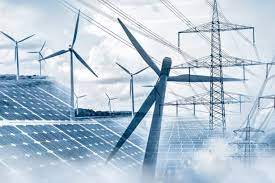There has been much discussion on the volatility of the price of crude oil: the market rule based on supply and demand, in addition to being subject to the seasonality of consumption and industrial trends, is strongly linked to environmental and social factors that affect the availability of extraction and transportation. Security in some areas of extraction or sea routes is challenged by conflicts or acts of piracy or sabotage, just to name a few well-known issues.
One of the lesser-told factors of the energy crisis that is causing bill costs all over Europe, is the fact that this summer less wind has blown. Especially in the north of the continent, in 2021 the strength of the currents was between 10 and 15% lower than the expected average…slowing down the wind turbines that were supposed to guarantee energy.
In fact, it could be said that climate change has already impacted the solutions available to combat climate change!
Even if the human impact on global warming is minimal compared to natural cycles, we must certainly act on the part that depends on us.
Unfortunately, regardless of the will of the various countries to break away from the servitude of fossil fuels, it must be admitted that the renewable sources available are not yet capable of guaranteeing a real ecological transition. Perhaps this is the real reason for the unenthusiastic approach to “changes” of many Rulers … if not for the generic statements that commit the distant future more than the present and more for coal alone.
Except for the young people who follow Greta, animated by youthful dreams and impulses, everyone can understand that forcing the industry with too rapid change could mean a stalemate or the destruction of the economies of many countries, if not the whole world. After all, no one – not even most young dreamers – is willing to make a drastic life change.
Economic collapse is as dangerous as the effects of climate change.
We could easily have a large amount of energy from hydroelectric and nuclear sources, but there is already an endless discussion about the safety and disposal of nuclear waste or other environmental discussions related to large dams.
The political and industrial commitment must be in the search for real alternatives rather than in the fluctuating popular consensus or the immediate profit on what is available; perhaps the concrete ecological alternatives are still to be invented or lie in the still theoretical solutions: we must not be under the illusion that eternal batteries or the availability of hydrogen in large volumes are already industrial-grade.
It is very likely that oil and gas will not leave us anytime soon, beyond the thunderous announcements of politicians looking for some quick response to public opinion.
Perhaps the real immediate solution is the reduction of energy consumption, this should not be difficult, if environmental consciences do not lie, even if paradoxically, the ecological transition will need a large amount of fossil fuels (wind turbines, or other solutions, are not made with the magic wand)
The industry has provided us with vehicles that consume and pollute less than previous models; we can give up a bit of travel and a bit of heat in our homes … but it is certainly strange that the same man, who became excessively rich by promoting electric cars and supertrains, also promotes useless and energy-intensive space travel; it is strange that the man who delivers the fruits of globalization home to us only cares about finding a faster way to expand his business, at the expense of more sustainable businesses; it is strange that no one wants to give up chatter, dispersed in millions of useless messages, ignoring the immense absorption of energy for the functioning of algorithms that already claim to be vital.
Perhaps there is, in part already there, a sustainable way to extract oil and gas (certainly abandoning the absurd practice of extraction with destructive methods such as the fragmentation of rock shales). There could be consumption, just as sustainable (intelligent), until science offers us a real alternative.
Surely we could decrease, more rapidly than any other solution, the suffocation of the seas with plastic or the deforestation of the lands: this would give a sure hand to the ecological rebalancing of the Planet.
Leaping through hoops to get out of the fossils too quickly could have worse consequences
Romano Pisciotti


